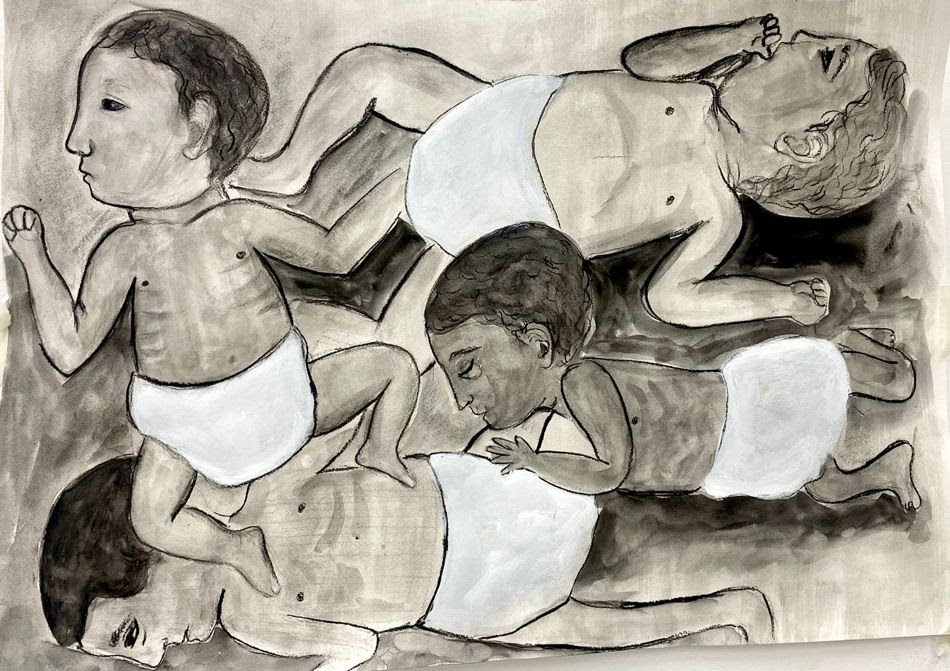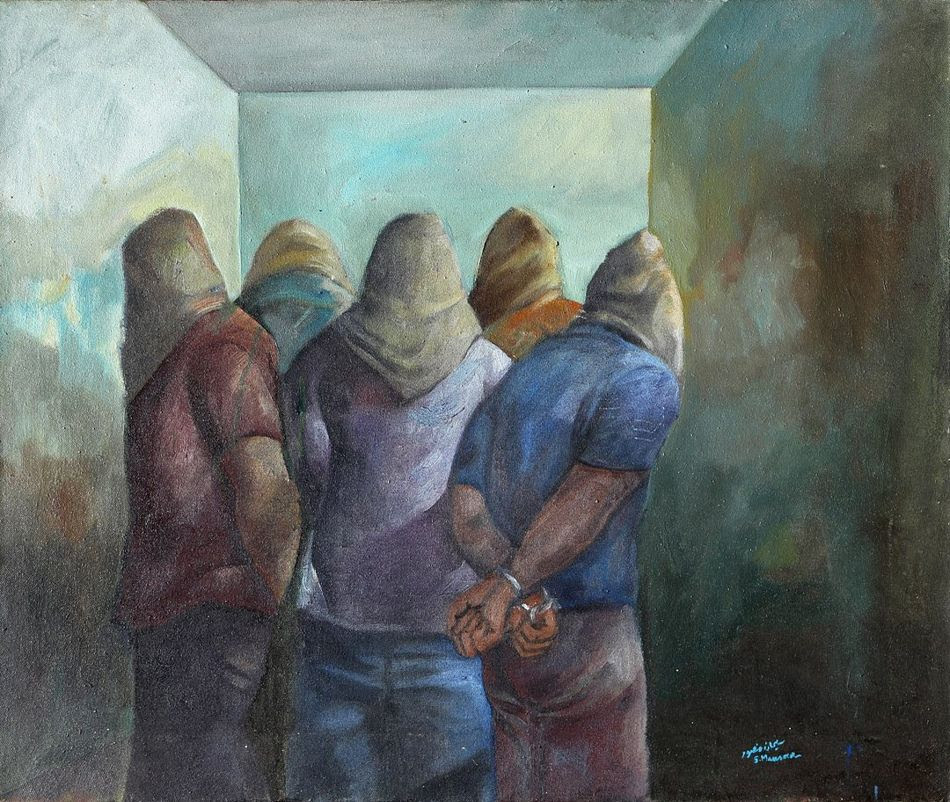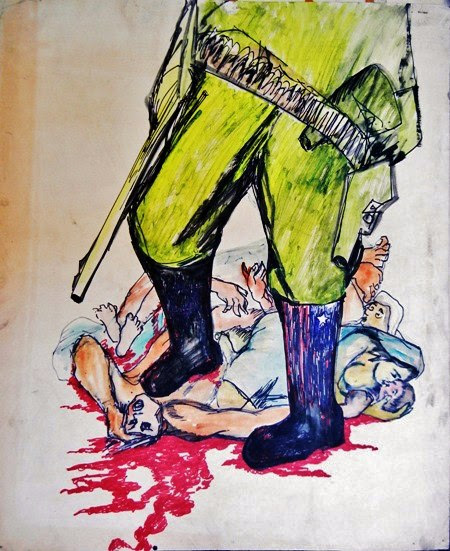Genocide: The Gaze from the Abyss
Left-progressive websites don’t always get it right. Take Media Lens, for example. In October, we discussed the corporate media invention of so-called ‘disinformation experts’. We lampooned the claim that although journalists are ‘working within profit-maximising, billionaire-owned, advertiser-dependent, government-subsidised media, they are nevertheless exposing “disinformation” without the slightest trace of bias’.
Last May, the BBC unveiled just such an initiative:
BBC Verify is transparency in action – fact-checking, verifying video, countering disinformation, analysing data and explaining complex stories in the pursuit of truth.
We took it for granted that this effort to ‘Verify’ the ‘truth’ would be a clueless, clawless, Orwellian, power-friendly farce; a BBC Bellingcat. And such indeed has mostly been the case.
Imagine our surprise, then, when we saw this report from BBC Verify on the front-page of the BBC website:
Satellite images commissioned by the BBC reveal the extent of destruction across Gaza… While northern Gaza has been the focus of the Israeli offensive and has borne the brunt of the destruction, widespread damage extends across the entire strip.
We posted a response on X, formerly known as Twitter:
To be fair, we never expected anything like this from BBC Verify; these maps are staggering:
Satellite data analysis suggests that almost 98,000 buildings across the whole Gaza Strip may have suffered damage.
Near-total annihilation.
The BBC report included a shocking photo montage showing how ‘a skyline of multi-storey buildings and a mosque was gradually reduced to rubble between 14 October and 22 November’. Note, this was not in reference to a single apartment block, but ‘a skyline of multi-storey buildings’.
This analysis genuinely helped to raise awareness of the true, appalling scale of Israel’s assault on Gaza. And the article was not heavily gaslit by the usual Israeli propaganda. Instead, there was merely this:
The BBC has approached the IDF for comment.
Contrary to the belief of some of our critics, we don’t hate to see positive examples of this kind that appear to contradict the thesis that state-corporate media function as a propaganda organ for powerful interests. In fact, we are only too pleased, because we have hoped for two main outcomes from our work. While our key aim has always been to increase public awareness and participation empowering progressive alternatives to ‘mainstream’ journalism, we have also hoped to encourage ‘mainstream’ journalists to improve their performance as far as they are able within the severe limits set by state-corporate media.
Readers sometimes commiserate with us: it must be terrible to be despised by everyone in the ‘mainstream’. In truth, they would be surprised at the number of senior journalists who have told us privately that our work made them rethink US-UK war crimes and double standards. Some have actually thanked us for our ‘guidance’. As we have documented, even former Guardian editor Alan Rusbridger and senior BBC journalist Nick Robinson have mentioned us with approval in their books on British journalism.
More broadly, it is astonishing how good people, whistleblowers defying all expectations, emerge from the unlikeliest of places.
Consider Josh Paul, former director of congressional and public affairs, who spent 11 years in the US State Department’s Bureau of Political-Military Affairs, the US government entity most responsible for the transfer and provision of arms to foreign countries. Who but cynics and sociopaths would work in such a place?
And yet, on 18 October, Paul sent a powerful letter of resignation to protest the massacre of civilians in Gaza. He wrote:
I believe to the core of my soul that the response Israel is taking, and with it the American support both for that response, and for the status quo of the occupation, will only lead to more and deeper suffering for both the Israeli and the Palestinian people – and is not in the long term American interest. This Administration’s response – and much of Congress’ as well – is an impulsive reaction built on confirmation bias, political convenience, intellectual bankruptcy, and bureaucratic inertia. That is to say, it is immensely disappointing, and entirely unsurprising. Decades of the same approach have shown that security for peace leads to neither security, nor to peace. The fact is, blind support for one side is destructive in the long term to the interests of the people on both sides. I fear we are repeating the same mistakes we have made these past decades, and I decline to be a part of it for longer.
In an interview with Democracy Now!, Paul added:
I decided to resign for three reasons, the first and most pressing of which is the very, I believe, uncontroversial fact that U.S.-provided arms should not be used to massacre civilians, should not be used to result in massive civilian casualties. And that is what we are seeing in Gaza and what we were seeing, you know, very soon after the October 7th horrific attack by Hamas. I do not believe arms should be — U.S.-provided arms should be used to kill civilians. It is that simple.
Secondly, I also believe that… there is no military solution here. And we are providing arms to Israel on a path that has not led to peace, has not led to security, neither for Palestinians nor for Israelis. It is a moribund process and a dead-end policy.
And yet, when I tried to raise both of these concerns with State Department leadership, there was no appetite for discussion, no opportunity to look at any of the potential arms sales and raise concerns about them, simply a directive to move forward as quickly as possible. And so I felt I had to resign.
Apart from a single substantive mention and a couple of smaller mentions in the Guardian, Paul’s resignation has been buried by all other UK national newspapers, with a single mention on the BBC website.
Propaganda Weathering And Erosion
As that media response suggests, it is fine to welcome positive examples, but not to morph into political Pollyannas detecting deep change where none exists.
A case in point was provided by Guardian columnist Simon Jenkins writing of Gaza:
For the first time in my adult life I cannot watch – or read – the news. Its presentation makes me profoundly upset.
Was this a rare expression of heightened dissent bucking the trend? We posted our ‘heartful thanks’ to Jenkins on X/Twitter for ‘supplying the ultimate example’ of the tendency described by Edward Herman and Noam Chomsky:
While the coverage of the worthy victim was generous with gory details and quoted expressions of outrage and demands for justice, the coverage of the unworthy victims was low-keyed, designed to keep the lid on emotions and evoking regretful and philosophical generalities on the omnipresence of violence and the inherent tragedy of human life. (Herman and Chomsky, Manufacturing Consent, Pantheon Books, 1988, p. 39)
In response, Justin Schlosberg, Professor of Media and Communications at University of Westminster, wrote to us on X/Twitter:
Actually I think this [Jenkins’s comment] is testament to the fact that broadcasters are not conforming to the propaganda model on this issue. Hence the need for liberal columnists to retreat and recoil in confused anguish.
He quickly caveated: “Should have added *on the whole*”
We suspect Professor Schlosberg’s comments are symptomatic of what we call ‘propaganda weathering and erosion’. It is easy to be overimpressed by media reporting of power-unfriendly events that can’t be ignored. It’s naturally difficult to see what isn’t there: crucial political and historical context. It’s also difficult to keep reminding oneself that the extent and tone of media coverage would be very different if the victims were ‘us’ rather than ‘them’. Imagine, for example, Western media coverage if Israel was some imaginary Megapower dwarfing the US, and Gaza was New York City, with 234,000 homes damaged, 46,000 completely destroyed, amounting to 60 per cent of the housing stock, with 1.5 million people fleeing for their lives. And then being bombed again.
Schlosberg is wrong, broadcasters are once again conforming on Gaza. But don’t take our word for it; consider the courageous testimony from a rare BBC whistleblower.
On 24 October, BBC correspondent Rami Ruhayem – a former journalist for the Associated Press, who has worked as a journalist and producer for BBC Arabic and the BBC World Service since 2005 – sent a letter to the BBC’s Director-General, Tim Davie:
Dear Tim,
I am writing to raise the gravest possible concerns about the coverage of the BBC, especially on English outlets, of the current fighting between Israel and Palestinian factions.
It appears to me that information that is highly significant and relevant is either entirely missing or not being given due prominence in coverage.
Ruhayem continued:
The nature of the Israeli response to the attack by Hamas on October 7 has prompted “over 800 scholars and practitioners of international law, conflict studies and genocide studies” to warn of ‘the possibility of genocide being perpetrated by Israeli forces against Palestinians in the Gaza Strip.
They said:
As scholars and practitioners of international law, conflict studies, and genocide studies, we are compelled to sound the alarm about the possibility of the crime of genocide being perpetrated by Israeli forces against Palestinians in the Gaza Strip. We do not do so lightly, recognizing the weight of this crime, but the gravity of the current situation demands it.
I invite you to sift through our coverage, past and present, for any trace of the above; whether in explainers, or interviews, or features, or news analysis. Is it there at all, and if so, is it given the prominence it deserves?
Ruhayem didn’t stop there:
Words like “massacre”, “slaughter”, and “atrocities” are being used—prominently—in reference to actions by Hamas, but hardly, if at all, in reference to actions by Israel.
Does this not raise the question of the possible complicity of the BBC in incitement, dehumanization, and war propaganda? How would the BBC respond to this?
He continued:
Our current coverage kicked off following the Hamas attack. Doubtless, it is major news. But that doesn’t mean history started on October 7. We should incorporate into our coverage an accurate, balanced, fair, and truthful representation of the reality leading up to that moment.
I won’t go into detail, but simply remind you of three terms: apartheid, ethnic cleansing, and settler-colonialism.
These are terms used by many experts and highly respected organizations to which the BBC usually defers. They are used to describe the nature of Israeli rule over Palestinians as well as the methods used by Israel to oppress generation after generation of Palestinians. They are based on extensive evidence.
To what extent is this reflected in our coverage? Without such context, can we claim to have adequately informed the public? Or are we withholding highly relevant and significant information without which the basics of the conflict cannot possibly be understood?
Our December 6, ProQuest media database search for “Rami Ruhayem” and “Tim Davie” found a single mention by Alessandra Scotto di Santolo on Express Online, 26 October 2023: ‘Israel Hamas: Israel preparing for ground invasion in Gaza and vows to eliminate Hamas.’ Otherwise, Ruhayem’s vital whistleblowing has been blanked by the entire UK national press and the BBC. The fact that Ruhayem has not tweeted since October 25, the day after he sent the letter, surely tells its own story.
Pro-Truth, Pro-Justice
Last month, scholar and activist Norman Finkelstein commented with his usual precision:
I don’t want to quibble over terminology, but sometimes if the terminology is wrong at the outset, then it confuses things moving forward. I’m not pro-Palestinian, I’m not pro-Israeli. I’m pro-truth and I’m pro-justice. If truth is on the Israeli side, I will support Israel. If justice is on the Israeli side, I’ll support Israel. And the same thing goes for the Palestinians.
I’ve spent the greater part of my adult life, you can say, beginning 1982 – so it’s more than four decades – researching, studying the Israel-Palestine conflict. And it’s my conclusion, at the end of that research – but already early on – that the case that Israel makes for its crimes are, in large part, fabrications, misrepresentations and distortions. And then, [on] the other hand, the Palestinian case is very strongly supported by the evidence.
We are also not pro-Palestinian – we are pro-truth and pro-justice. Because truth and justice do not exist in a soulless vacuum, we are also pro-compassion.
It is quite obvious that violence and hatred born of cruelty and injustice cannot be erased by yet greater cruelty and injustice. What results do we expect from Israel intensifying the strategy of ethnic cleansing that gave rise to Hamas in the first place?
We live in a terribly cruel and cynical time where our supposed leaders ignore clear public support for a ceasefire, just as they ignore the vital need for immediate action on climate change, just as they sacrifice Ukraine to US realpolitik, just as they mercilessly keep Julian Assange entombed for 1701 days in a high-security prison without charge. Did the Dark Ages ever really end?
Hard-boiled leftists may quiver and quail; intellectuals may shriek and cringe, but the Buddha was exactly right when he said:
Hatred can never put an end to hatred; love alone can. This is an unalterable law. (Cited, Eknath Easwaran, The Dhammapada, Arkana, 2009, p. 78)
Yes, the West can devastate its enemies, but it cannot avoid the price described by Nietzsche:
He who fights with monsters should be careful lest he thereby become a monster. And if thou gaze long into an abyss, the abyss will also gaze into thee. (Nietzsche, Beyond Good and Evil, Emmanuel, 1917, p. 87)
After a century spent ‘fighting fascism’ and ‘waging war on terror’, Nietzsche’s abyss is here, now, gazing back at us from the coldly indifferent faces of Western leaders observing the genocidal slaughter in Gaza.
And it is gazing at us from the silently, inexorably rising temperatures that will ultimately render Israel-Palestine uninhabitable to all human life.
It turns out that one consequence of fighting with monsters – of building a global military-industrial machine dedicated to killing for profit – is that we lose the capacity to fight for life.
Media Lens is a UK-based media watchdog group headed by David Edwards and David Cromwell. The most recent Media Lens book, Propaganda Blitz by David Edwards and David Cromwell, was published in 2018 by Pluto Press. Read other articles by Media Lens, or visit Media Lens's website.
Six Wars Old
Israel’s repeated military assaults on Gaza have devastating consequences for children. Israel is not only killing Palestinian children at astonishing rates, but also killing the childhood of those who survive.
Visualizing Palestine is the intersection of communication, social sciences, technology, design and urban studies for social justice. Visualizing Palestine uses creative visuals to describe a factual rights-based narrative of Palestine/Israel. Read other articles by Visualizing Palestine, or visit Visualizing Palestine's website.










